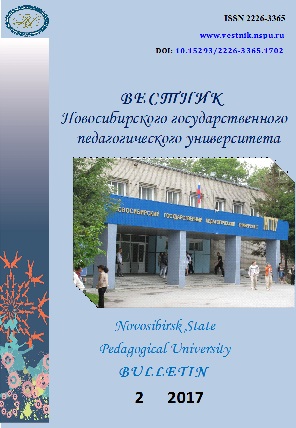Жанры речи в аспекте перевода (на материале научных текстов)
Speech genres in the aspect of translation (on the material of scientific texts)
Author(s): Olga Anatolievna Kazakova, Ekaterina Aleksandrovna Golovacheva, Tatyana Borisovna FrikSubject(s): Comparative Linguistics, Translation Studies
Published by: Новосибирский государственный педагогический университет
Keywords: Speech genre; scientific style; academic text; translation; translation transformations; communicative purpose; author; recipient; Russian; English;
Summary/Abstract: Introduction. The paper focuses on actual scientific areas in theory of speech genres and translation. The current study aims to propose solutions to theoretical and practical problem of speech genre role in translation. This paper is intended to identify genre forming factors of scientific text influencing translation. Materials and Methods. The current study is implemented on materials of three genres referring to different types of scientific texts: scientific-technical monograph (scientific texts), popular scientific speech (popular scientific texts), and user’s guide (documentary texts (scientific and business)). Speech genre is considered as a model of statement; its specificity is formed by a set of genre’s characteristics. Genre analysis of the original English texts, the official translations, and Russian texts of respective genres has been conducted; a comparison of the official and interlinear translations has been undertaken; the cases of discrepancies between the official and interlinear translation on the main genre parameters such as the communicative goal, the image of the author and the recipient, dictum, and linguistic features have been also discussed. Results. Genre transformations and modification of genre-forming parameters of the original text (taking into account the features of these parameters specific to genre of host language) often made by scientific text translators have been described. It was discovered that the translators seek to preserve in translation the communicative purpose and the communicative goals of the original text (i.e. do not apply the necessary genre transformation according to the genre-forming parameter), which leads to disorders of language, genre, and stylistic norms of the host language. Conclusions. All genre-formed parameters of the scientific text have an impact on transla-tion: professional translators use the genre transformation in accordance with the common genre and stylistic translation rules. The degree of influence of genre-forming parameters on translation primarily depends on the type of compositional and semantic organization of scientific text: genres with ‘fixed’ structure require more genre transformations; genres with ‘loose’ struc-ture do not need genre transformations. There is the problem of genre-oriented training of pro-fessional translators at present.
Journal: Вестник Новосибирского государственного педагогического университета
- Issue Year: 7/2017
- Issue No: 2
- Page Range: 161-176
- Page Count: 16
- Language: Russian

